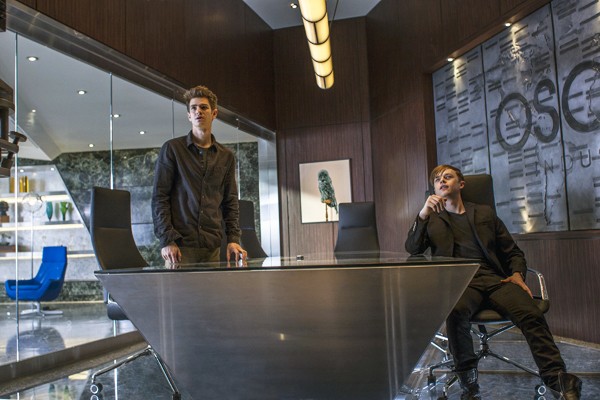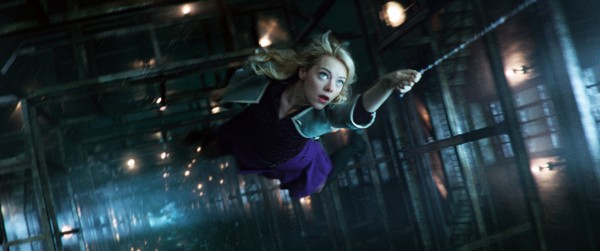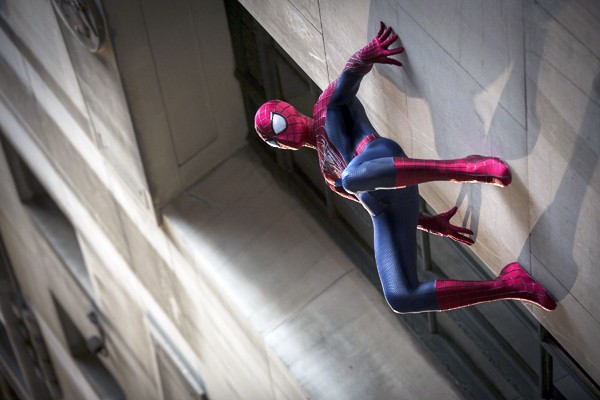If you’ve seen one Spider-Man origin story, you’ve seen them all. At least, that was the thinking behind why I never got around to watching anything more than bits and pieces of The Amazing Spider-Man, the Marc Webb/Andrew Garfield/Emma Stone 2012 reboot of the Sam Raimi/Tobey Maguire/Kirsten Dunst 2002-2007 film trilogy, itself natch an adaptation of the popular 1962 – present comic book series.

Spider-Man hangs out
My lack of interest wasn’t a knock on the appeal of the film, because I really really like Garfield (Never Let Me Go); I like Webb ((500) Days of Summer); and I possibly love Stone (Crazy, Stupid, Love). Instead, my not seeing The Amazing Spider-Man was because I just can’t keep up anymore with these comic book movie origin stories. I’m utterly fatigued.
Origins are the most overrated — or, the most over-emphasized — thing about comics. Apart from early issues in a series or occasional critical flashbacks, origin stories aren’t a part of the process or ongoing appeal of mainstream comics. You need to know Bruce Wayne’s parents were murdered in front of him, but you don’t need to be told that every time he suits up to go punch the Riddler.
The comics medium has hammered out an appropriate ratio of origin to story. The comics-in-film medium decidedly has not: Marvel and DC films hemorrhage origin stories. The device at its most tediously redundant has Peter Parker bitten again by an arachnid in The Amazing Spider-Man and Superman’s Kryptonian-Kansas upbringing retold in last year’s Man of Steel. It means we’re subjected to an energy-neutral Thor film until he finally holds the hammer in the last 15 minutes, a moment of too-long-delayed orgiastic joy. In next year’s Fantastic Four reboot, no doubt we’ll have to witness another belabored cosmic ray exposure before being allowed to enjoy some be-flamed action.

Peter (Andrew Garfield) and Harry Osborn (Dane DeHaan) ponder mortality
When comic book films do this, it is of course because they have on their hands a built-in audience and a guaranteed box office success, and they want to prolong the tale they have to tell for as long as they can to ensure as many “safe” sequels as possible. An origin story doesn’t intrinsically have to be a delaying tactic. Consider Christopher Nolan’s commitment to the task in Batman Begins, where he asserts that the one pivotal moment where everything changes is far less interesting than the resultant psychological ramifications.
That’s a long way of saying I didn’t go out of my way to see The Amazing Spider-Man but happily consumed The Amazing Spider-Man 2. A visit to Wikipedia beforehand was more than adequate to get the plot particulars of the first film. Comically enough, the sequel very much has one foot in its origin.
The film starts with a recap of the last film: seriously. But before long it uses that regurgitation to trampoline into new plot points. Turns out, Peter’s parents (Campbell Scott and Embeth Davidtz) were hunted by Oscorp operatives but secreted away the truth of what they had discovered before they were killed. It’s a genuinely poignant scene, followed by a genuinely exhilarating one: Spider-Man slicing down city canyons with a whoop, pursuing a criminal and enjoying the chase. The tension in the sequence comes not from the Adidas-tracksuit-wearing bad guy, Aleksei Sytsevich (Paul Giamatti), who has commandeered an Oscorp truck carrying plutonium and is being pursued by all of the NYPD, nor from Spider-Man’s near-death rescue of a pedestrian, Max Dillon (Jamie Foxx), but from the ticking clock of whether or not Peter can do all this and still make his graduation in time to hear his girlfriend Gwen Stacy’s (Stone) valedictorian speech.

Gwen Stacy (Emma Stone) hangs by a silk thread
Peter loves Gwen but promised her dad (Denis Leary) before he died he wouldn’t endanger her life, so the couple breaks up; it makes Peter want to go jump off a building. Peter is reunited with his old buddy, Harry Osborn (Dane DeHaan), but both young men are troubled by the legacies of dead father figures. The Amazing Spider-Man 2 continuously alternates these currents of dark and light moments, and Webb handles the switches with skill. It’s one of the best things about the film, and is ultimately what the film is about.
In addition to the aforementioned, the film services the needs of characters such as Peter’s Aunt May (Sally Field) and Oscorp functionaries Norman Osborn (Chris Cooper, maniacal laugh), Felicia (Felicity Jones), Smythe (B. J. Novak), and Menken (Colm Feore) — all of them plus the super-villainous transformations of Max into Electro, Harry into Green Goblin, and Aleksei into Rhino. If all that sounds like 10 pounds of shit in a five-pound bag, well, sometimes it is. It makes up for it with an extra-long runtime. You may or may not see that as a positive.
The short end of the stick goes to Foxx, whose Electro effects and goofy psychosis is just too much. DeHaan fares much better in the script, and he brings to the table Leonardo DiCaprio’s looks and Brad Pitt’s voice. It’s a strange combo.

Spider-Man does whatever a spider can
Rising above it all is the chemistry between Garfield and Stone. They take their dialogue and deliver awkward line readings that sound spontaneous rather than scripted. Vive le Peter/Gwen.
The Amazing Spider-Man 2
Now playing
Multiple locations